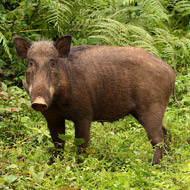
Driven to the city by development and construction
Police in China spent over three hours last week attempting to catch a wild boar which found itself lost in the financial district of Hong Kong.
Footage of the chase was captured on film by Periscope user @Penguinsix, who added to the suspense by humming the Mission Impossible theme tune.
It is the second time that a wild boar has been spotted in the city in two weeks, with the first sighted outside a luxury hotel.
Wildlife experts are blaming the recent incidents on development projects and construction around country parks.
Dr Gary Ades, head of fauna conservation at the Kadoorie Farm and Botanic Garden, told the South China Morning Post that "boars hate change and often panic when their environment changes."
Wild boars are the largest land mammal in Hong Kong, with adults measuring up to two meters long and weighing up to 200kg .
Over the last few years, the animals have been spotted throughout the city in theme parks, shopping malls and private housing estates.
"They're very funny animals," said Gary. "Whenever there is change [in their environment] they just don't want to be there.
"They create these beautiful animal highways in the dirt, which they use to get around, but a moment a new tree is planted there is confusion."
Wildlife experts say that regular feeding by humans (which is illegal), predation by feral dogs, and even the weather may also be driving the pigs into the city.
Drier winters make it difficult for pigs to get to the worms they usually feed on from the ground.
Image (C) PJeganathan/Wikimedia



 The Veterinary Medicines Directorate (VMD) is inviting applications from veterinary students to attend a one-week extramural studies (EMS) placement in July 2026.
The Veterinary Medicines Directorate (VMD) is inviting applications from veterinary students to attend a one-week extramural studies (EMS) placement in July 2026.